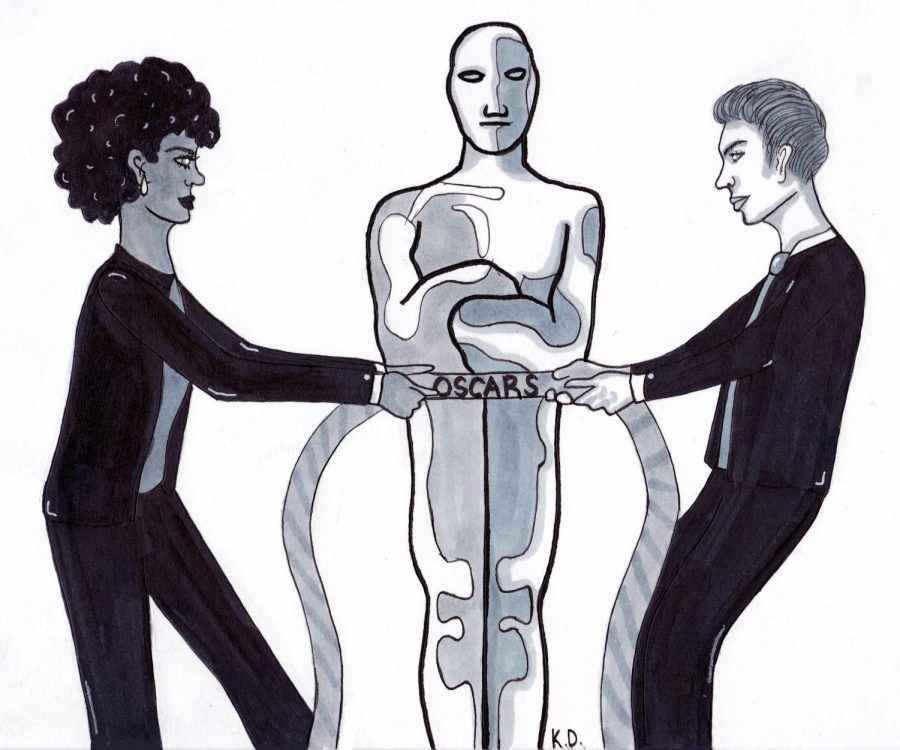The Oscars’ Diversity Crisis
February 14, 2020
The nominations for the 92nd Academy Awards were released on Jan. 13 and controversy immediately ensued — only one person of color was nominated for an acting award and no women were nominated in the Best Director category.
The public pointed specifically to talented directors Greta Gerwig (“Little Women”) and Lulu Wang (“The Farewell”) as snubs and expressed their outrage online. Writer Roxane Gay tweeted: “Every year the Oscar nominations are a hot mess but this year offers a particularly heated mess. To overlook Lulu Wang, Melina Matsoukas [“Queen & Slim”], Greta Gerwig, Lupita Nyong’o [“Us”] and J. Lo [“Hustlers”]. Smh. Did the academy even watch movies this year?”
Even this year’s Best Supporting Actress winner Laura Dern agreed, proclaiming after her win: “If I could give this Oscar to Greta Gerwig, I would do it right now. Lulu also.”
Since its beginnings in 1929, the Oscars have been a white man’s game. Only five women in Oscars’ history have received Best Director nominations and of those five, only Kathryn Bigelow (“The Hurt Locker”) was victorious. On top of that, just seven total Latin American and Asian American actors have won an award.
Not a single person of color was nominated for an Oscar until 1940, when African-American actress Hattie McDaniel won for her role as Mammy (a slave, of course) in the classic Civil War drama “Gone with the Wind.” It took 10 more years until another African American was nominated and an additional five years afterward for another.
And the sad fact is that it seems like there’s only room for one person of color per category per year. Cynthia Erivo was the sole black acting nominee this year for her role as Harriet Tubman, (also a slave by the way) in the biographical drama “Harriet.” Many seasoned Oscar watchers expected Kenyan-Mexican actress Lupita Nyong’o to join her, but she did not earn a nod for her performance in the horror thriller “Us,” where she played two roles: Adelaide Wilson, a seemingly normal mother, and Red, Adelaide’s evil doppelgänger. According to IndieWire, Nyong’o’s role demanded immense physical distress and extensive research, as she “mimicked a voice condition called spasmodic dysphonia (SD), a neurological disorder that causes involuntary spasms of the larynx, typically brought about by trauma” for her performance as Red. The role was praised widely by critics and audiences alike, notching a Best Actress victory at the New York Film Critics Circle earlier this year, making it especially shocking when she did not receive an Oscar nomination. Similarly, Asian-American actress Awkwafina’s name was markedly absent from the Best Actress category for her role in “The Farewell,” a poignant comedy about the quirks of unspoken heartache in Asian culture. After Awkwafina clinched the Screen Actors’ Guild Award for Best Actress in a Comedy/Musical, many expected the momentum to carry into the Oscars, but the Academy opted for four blonde white actresses instead.
Asian talent has been historically so underrepresented at the Oscars that some try to claim that the patently white Natalie Portman is an Asian Oscar winner because she was born in Israel, a country geographically located at the southwestern tip of the Asian continent.
It’s rare that the talents of a person of color are acknowledged for playing anything but a stereotype of his or her race. Take Mo’Nique, for example, who won the 2009 Best Supporting Actress award for her performance in “Precious.” She played a drug-addicted, abusive single mother, a role all too common for black actresses. While the performance was profoundly moving, it further perpetuated the “angry black woman” stereotype so commonly portrayed in American media. Moreover, Whoopi Goldberg played a poor, downtrodden, abused woman in “The Color Purple,” Morgan Freeman played a mistreated chauffeur in “Driving Miss Daisy,” Octavia Spencer and Viola Davis played oppressed housekeepers in “The Help,” and Mexican actress Yalitza Mauricio portrayed a poor, live-in maid to an affluent family in “Roma.” Throw in Ruth Negga for “Loving,” Mary J. Blige for “Mudbound,” Mahershala Ali for “Moonlight” and the list of actors and actresses of color who highlight negative stereotypes and play marginalized outliers continues to grow.
Freeman in particular has gained countless nominations for various films, and won for his performance in “Million Dollar Baby” portraying an athletic trainer. But it took him over 40 years of film acting and nine snubs to achieve this honor. These portrayals directly reflect America’s views on minorities.
When will this change?
Jada Pinkett Smith popularized the protest #OscarsSoWhite in 2016; now, four years later, the Oscars still reflect American prejudices and biases. According to The Atlantic, The Academy’s members are 94 percent white, 76 percent male, and 86 percent age 50 or older. It may sound ghoulish, but we’re probably going to have to wait until a lot of them die to make any progress.












